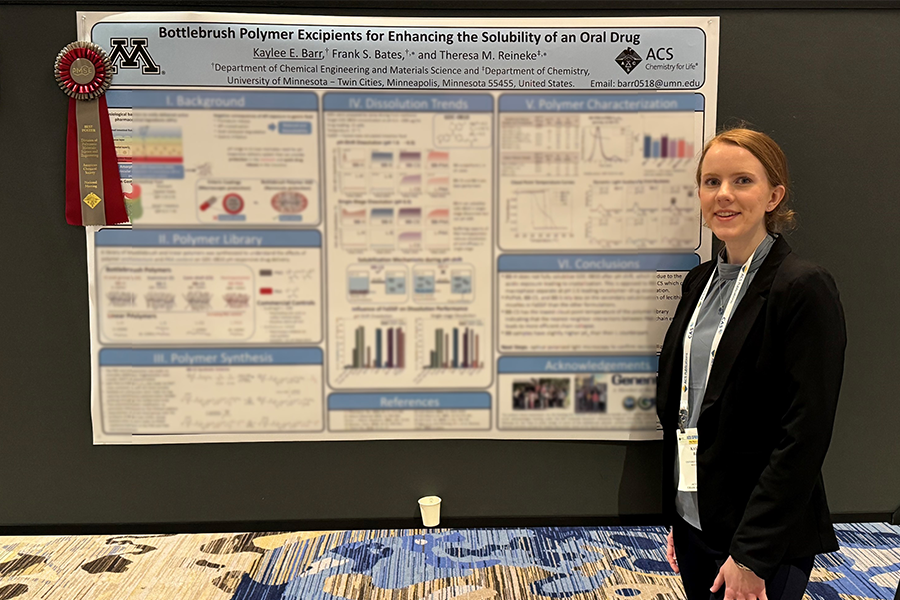Congratulations to CEMS Ph.D. candidate Kaylee Barr for being selected as a PMSE Centennial Graduate Student Best Poster Winner!

Kaylee Barr, a CEMS Ph.D. candidate jointly advised by Profs. Theresa Reineke and Frank Bates, has been selected as a Polymeric Materials: Science and Engineering (PMSE) Centennial Graduate Student Best Poster Winner. PMSE is an American Chemical Society Division that provides a polymer-based forum for the exchange of technical information and activities to foster interactions in polymer materials science and engineering.
Kaylee Barr attended the 2024 Spring ACS Meeting in New Orleans, LA, and presented her research poster at both the PMSE Centennial Poster Session for Graduate Students and Sci-Mix. PMSE officers and the Executive Committee selected Kaylee’s poster as a PMSE Centennial Graduate Student Best Poster Winner. The title of her research poster was “Bottlebrush Polymer Excipients for Enhancing the Solubility of an Oral Drug.”
Congratulations, Kaylee! For more information about the award and PMSE, visit their website. For more information about Kaylee's research, read the summary below.
Summary of Kaylee Barr's award-winning research: Many oral active pharmaceutical ingredients (APIs) are limited by their poor aqueous solubility in the gastrointestinal tract. Amorphous solid dispersions (ASDs) are an attractive method to disperse an amorphous API in a polymer matrix, enabling supersaturation above a drug’s crystalline solubility. In addition to solubility limitations, the harsh acidic conditions of the stomach can cause acidic hydrolysis and premature release of an API, reducing oral bioavailability. The versatile architecture of bottlebrush polymers offers a promising platform as stimuli-responsive materials. It is hypothesized that poly(N-isopropylacrylamide-stat-N,N-dimethylacrylamide) [PND] bottlebrush polymers with a poly(acrylic acid) [PAA] shell will undergo an extended-to-globule conformational transition to provide drug protection from premature release in the acidic gastric environment due to both thermoresponsive and pH-responsive properties. Bottlebrush polymer excipients were synthesized using controlled polymerization techniques to study the influence of architecture and PAA content on small molecule API pH-responsive delivery. This work demonstrates that incorporation of PAA into PND bottlebrush polymers facilitates protection in the acidic environment of the stomach and rapid drug release in simulated intestinal conditions.